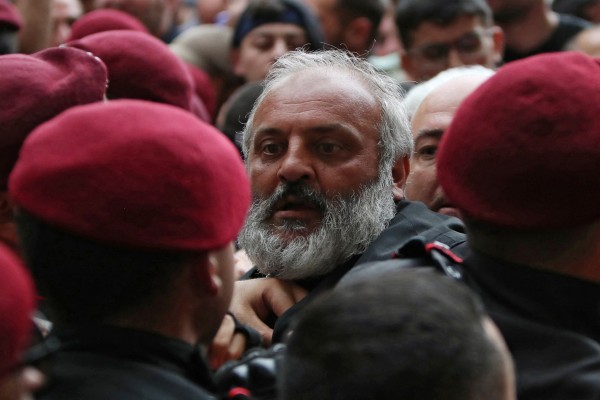A large crowd protested in Armenia’s capital Yerevan on Sunday against Prime Minister Nikol Pashinyan, led by a Christian cleric who announced the start of four days of rallies to seek to drive him from office.
Archbishop Bagrat Galstanyan is seeking to tap into popular anger over military defeats and territorial concessions to Azerbaijan, but Pashinyan has so far withstood the pressure.
“For four days, we will stay in the streets and squares, and with our determination and will, we will achieve victory,” said Galstanyan, who called on parliamentary factions to hold a special session on Tuesday to remove the government from power.
As it grew dark in Republic Square in #Yerevan, protesters lit up their phone flashlights. pic.twitter.com/yQpXEueK97
— Armenia Sputnik (@ArmeniaSputnik) June 9, 2024
A live video stream on YouTube showed thousands of people rallying in the centre of Yerevan and then marching peacefully through the streets with music blaring. There were no reports of arrests or clashes.
After weeks of protests against Pashinyan appeared to be losing momentum, Galstanyan is attempting to bring matters to a head with demands for a change of power within days.
He is calling for the appointment of a transitional government to “implement reconciliation”, manage foreign relations and prepare for snap elections.
But Richard Giragosian, director of the Regional Studies Center in Yerevan, said the move smacked of desperation in the face of waning protest numbers. The archbishop’s campaign was hampered by a lack of political experience and the absence of a clear strategy or alternative vision, he said.
The demonstrations, as yet, “do not pose any real challenge to the government. The only danger of escalation is from a possible over-reaction by the security forces,” Giragosian told Reuters.
Pashinyan is a former journalist who came to power after a wave of street protests in 2018. He came under heavy domestic pressure in 2020 after major losses to Azerbaijan in the second war the two countries had fought in three decades.
Last year Azerbaijan followed up with a lightning offensive to take back its Karabakh region, prompting an exodus of 100,000 ethnic Armenians who had enjoyed de facto independence there for three decades.
Pashinyan has criticised Russia for not intervening with its peacekeeping force in the region to stop Azerbaijani forces from retaking Karabakh.
He has publicly questioned Armenia’s traditional alliance with Moscow and started to forge closer ties with the West. A senior U.S. official, Assistant Secretary of State James O’Brien, was due in Yerevan on Monday for talks on bilateral ties and moves towards a peace treaty with Azerbaijan.
The trigger for the latest demonstrations against Pashinyan was his decision to hand back four deserted border villages to Azerbaijan in May.
Opponents called it a betrayal, but Pashinyan defended their return as a necessary step to avoid a further war that would end badly for Armenia.
(REUTERS)
In a career spanning three decades and counting, Ramananda (Ram to his friends) has been the foreign editor of The Telegraph, Outlook Magazine and the New Indian Express. He helped set up rediff.com’s editorial operations in San Jose and New York, helmed sify.com, and was the founder editor of India.com.
His work has featured in national and international publications like the Al Jazeera Centre for Studies, Global Times and Ashahi Shimbun. But his one constant over all these years, he says, has been the attempt to understand rising India’s place in the world.
He can rustle up a mean salad, his oil-less pepper chicken is to die for, and all it takes is some beer and rhythm and blues to rock his soul.
Talk to him about foreign and strategic affairs, media, South Asia, China, and of course India.





